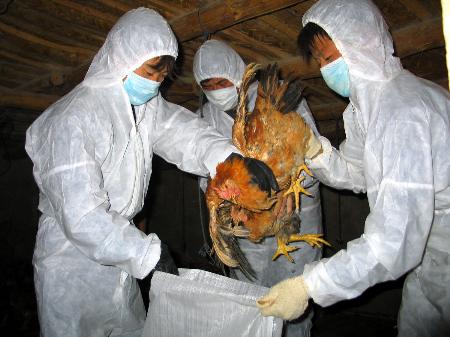
Controversial research into making bird flu easier to spread in people is to resume after a year-long pause.
Some argue the research is essential for understanding how viruses spread and could be used to prevent deadly pandemics killing millions of people.
Research was stopped amid fierce debate including concerns about modified viruses escaping the laboratory or being used for terrorism.
The moratorium gave authorities time to fully assess the safety of the studies.
A type of bird flu known as H5N1 is deadly and has killed about half the people who have been infected.
It has not caused millions of deaths around the world because it lacks the ability to spread from one person to another. Cases tend to come from close contact with infected birds.
Scientists at the Erasmus University in the Netherlands and the University of Wisconsin-Madison in the US discovered it would take between five and nine mutations in the virus’ genetic code to allow it to start a deadly pandemic.
Their research was the beginning of a long-running furor involving scientists, governments and publishers of scientific research.
The US National Science Advisory Board for Biosecurity asked academic journals not to publish key parts of the findings. It was concerned terrorists would use the details to develop a biological weapon.
It provoked outcry among some scientists who said their academic freedom was being restricted. Other scientists said the risk of the virus spreading was too great for such research to take place and described it as a folly.

The details were eventually published in the journals Nature and Science.
However, the academics involved agreed to a voluntary 60-day moratorium on research – which was later extended to more than a year.
It was to give governments time to review safety standards needed in laboratories to conduct research with enhanced viruses and whether they wanted to fund such research.
A letter signed by 40 virus researchers around the world, published in the journals Science and Nature, said the moratorium was being lifted.
It said appropriate conditions had been set in most of the world and their studies were “essential for pandemic preparedness”.
One of the leading proponents of the research Prof. Ron Fouchier, from the Erasmus Medical Centre, said it had been “frustrating” to shut down research for the year.
“This research is urgent, while we are having this pause bird flu virus continues to evolve in nature and we need to continue this research.
“We cannot wait for another year or two years.”
He expects to restart his laboratory’s work within the next couple of weeks.
However, it is a different case for many of the other research groups involved. The US has not decided on the conditions that it will allow the experiments to take place and the same applies to US-funded research taking place in other countries.
The decision has continued debate on whether the research should take place at all.